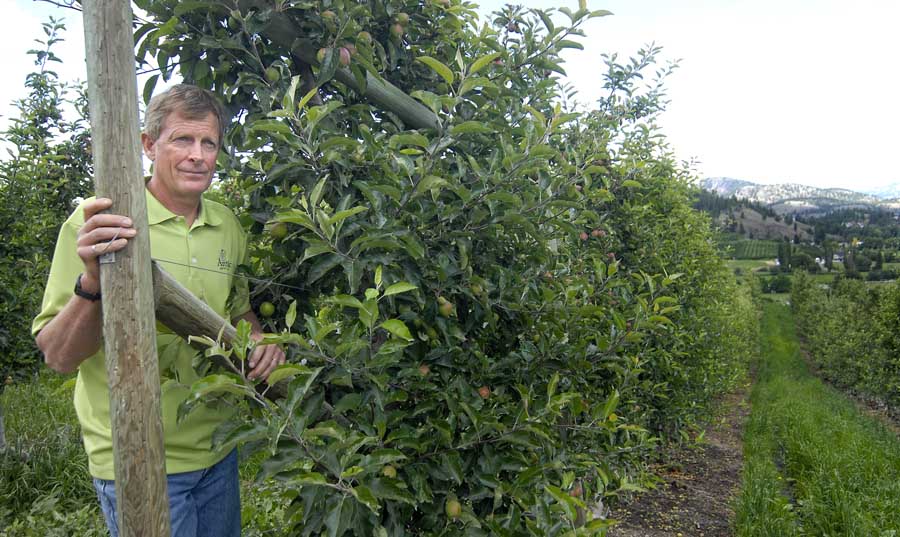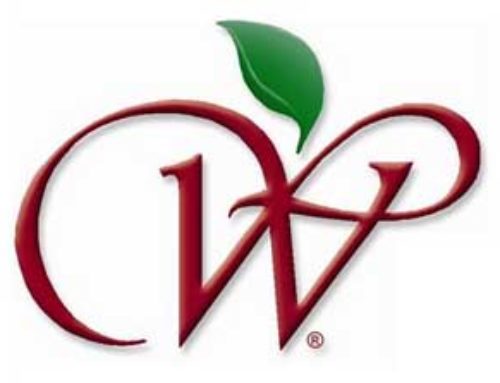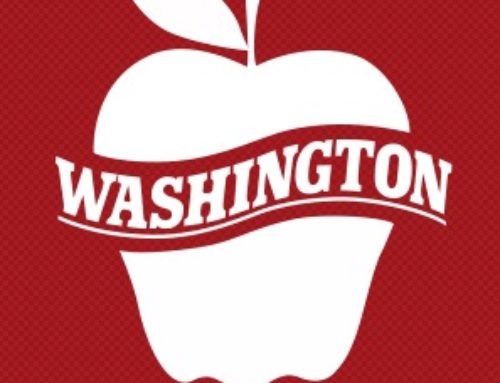
Neal Carter at his orchard in Summerland, British Columbia, is unshakeable in his belief that the GMO apple will change the fruit industry for the better. He plans to introduce more GMO apple varieties and later GMO cherries and pears. (Courtesy Sally Tonkin)
In 1999, Neal Carter got a decidedly unpleasant taste of the controversy he would ignite in the fruit industry.
That year, while vacationing abroad with his family, he got a call that a news crew had showed up at his orchard in Summerland, British Columbia, a verdant, mountainous place where orchards, vineyards and evergreens plunge toward Lake Okanagan.
Carter’s apple orchard normally would contribute to the beauty, but not on this day. Vandals had crudely severed 652 trees just steps in the snow from his front door.
The vandals wanted to make a point against genetically modified (GMO) fruit, which they knew was Carter’s business, and they alerted the news media to their action as a means of showing solidarity with protestors in Seattle at the World Trade Organization meeting. The vandals were never caught.
Carter not only felt a sense of personal violation, but he also recognized what he sees as the ignorance of his critics. None of the vandalized trees were genetically modified; the protesters instead had hacked ordinary Galas.
Carter’s modified trees were elsewhere.
But in his mind, his critics just refused to recognize that science was on his side.
He is unshakeable in his belief that genetic modification will change the fruit industry for the better, creating a profitable new category for fruit growers and nutritious, delicious food for consumers.
Carter today presides over an expanding company, Okanagan Specialty Fruits, that has gained government approval in the U.S. and Canada for sale to the public of genetically altered Arctic nonbrowning apples. (Arctic Granny Smith and Golden Delicious already have been deregulated in the U.S., and a similar application for Arctic Fuji has just been approved.)
Arctic apple plantings have expanded; his company is preparing to develop other GMO varieties and later seek approval for GMO cherries and pears.
Progress accelerated in 2015 when Intrexon Corp. bought Okanagan Specialty Fruits, adding resources to Okanagan’s development and marketing. Carter now runs Okanagan as a 10-person wholly owned subsidiary of Intrexon, a public company based in Germantown, Maryland.
Intrexon calls itself a leader in “synthetic biology” with investments in health, environment, food, energy and consumer products.
For all the progress, however, Carter and his products remain intensely controversial. Development of GMO food has triggered voter initiatives in different states, relentless criticism from environmental and consumer groups, and legislation in Congress.
In July, President Obama signed into law a measure that would require labelling of GMO ingredients.
Within the fruit industry, prominent growers such as Ralph Broetje of Prescott, Washington, unsuccessfully pleaded with the U.S. Department of Agriculture to decline deregulation of Carter’s Arctic apples, whose polyphenol oxidase, the enzyme that causes apples to brown, has been “silenced” by manipulation.
In a 2013 letter to the USDA, Broetje expressed fear of a consumer backlash that would damage sales of all apples. He also feared that organic apple crops would have unintended contact with genetically engineered pollen. The USDA rejected those arguments.
Looking to the future
Given such bruising controversy, I expected to meet an individual who was either combative or defensive. Carter was neither, though he is definitely energetic, typically working a 100-hour week.
His idea of vacation is going someplace dry, like Utah, Arizona or Colorado, and rising at dawn for a brisk day of mountain biking.
Carter, 59, is a bioresource engineer who spent 30 years working for Agrodev Canada and others on consulting projects in more than 50 countries. He served as manager of the Middle East region from 1985 to 2001, at times commuting from Canada.
“You name the crop, I’ve grown it,” he said. He ended his consulting practice in 2007.
Carter grew up in British Columbia, where his parents farmed.
He and his wife, Louisa, bought their 22-acre apple and cherry orchard in 1995 and later named it Laughing Coyote Orchards, a company separate from Okanagan Specialty Fruits.
Counting his own and leased land, he and his family farm about 60 acres of apples and cherries, “which is nothing in Washington terms but in B.C. terms actually makes us a sizeable orchard.”
He uses seasonal workers for thinning and harvesting, but he, his son and his nephew do most of the spraying, mowing, weed spraying, much of the pruning, and other chores. At home, he raises Gala, Ambrosia and Honeycrisp apples, all of which are packed and marketed by Washington companies. His cherries are packed in Oliver, B.C.
Carter’s home in the hills above Summerland is hardly the lair of a Dr. Evil, as his most ardent critics might imagine. It’s decidedly normal, complete with a big dog to greet visitors. Carter explained that Okanagan’s high-tech work and staff are elsewhere.
Research and gene manipulation is done at a lab in Saskatoon, Saskatchewan, the epicenter of ag-bio commercial and university research in Canada.
Other staff and consultants work out of offices in Manitoba, Saskatoon, Vancouver and North Carolina. The GMO apples are grown at undisclosed locations in New York and Washington. As of June, an estimated 80,000 trees were growing Arctic apples in commercial orchards, with another 325,000 trees in nurseries.
The underlying concept for Arctic apples is quite simple and should not be alarming, he said.
They insert a duplicate copy of the browning gene into the apple which, because it doesn’t want two copies of a gene, shuts down the gene that causes browning.
In all other respects, it’s an ordinary apple, he said. “We think that a lot of anti-GM discussion out there is due to a lack of education,” said Carter. “It kind of plays into the anti-science movement. People aren’t believers in science any more. The anti-vaccine folks are a great example of it.”
Carter said he expects sales of Arctic apples to consumers to occur in stages as volume builds, starting in fall 2016 — about 50 bins of sliced product will be sold in regional markets west of the Rockies.
The first year will involve testing packaging, pricing and other factors. Packaging of Arctic apples was unveiled in October at the Produce Marketing Association meeting in Orlando, Florida.
Part of his optimism about GMO apples stems in part from what he sees as the service industry’s unhappiness with typical sliced apples.
Some companies won’t develop new products with apples as an ingredient because of perishability issues, he said.
By contrast, he says, you can slice Arctic apples, rinse them with chlorinated water for control of bacteria, and they will keep in a Ziploc bag in a cooler for two to three weeks.
For commercial applications, more treatment might be needed for sanitation.
“They won’t go brown, but they might get mold,” he said of the slices. Even after an extended period, when you open the bag the contents will smell like apples, not additives, he said. “Arctic apples eat well and look good.”
To a large extent, the debate over GMO apples now resides with consumers.
Jim Bair, president of the industry group USApple, says the market will decide if it wants Arctic apples.
It remains to be seen whether Arctic apples will create new food categories and therefore increase overall demand for apples, as is predicted by Okanagan Specialty Fruits.
“The magic hand of the free market will determine the success of their product,” Bair said.
USApple will meanwhile continue to support and promote research that shows the health benefits from eating apples, he said.
A page on USApple’s website addresses the Arctic apple, saying in part: “Arctic apples offer the same nutrition benefits as non-GMO apples. … To continue discovering new and valuable benefits from apples, USApple supports advancements from technology including genetics and genomics research. … All other apples are non-GMO and will remain in the market for shoppers to continue buying. And, the company that developed Arctic apples asserts its Arctic brand will be clearly marketed and sold under the Arctic label, allowing consumers to make informed purchase decisions.”
Arctic apples may have a pathway to success, but threats remain for Okanagan Specialty Fruits. Pirates might try to steal the company’s intellectual property.
For that, Okanagan Specialty Fruits has lots of lawyers, and DNA testing would easily uncover any trade theft, said Carter.
The bigger threat would be what Carter would call fear mongering by critics on social media. Even on that front, Carter isn’t overly concerned.
A serious campaign against Arctic apples would require organization and connections, he said, and Okanagan Specialty Fruits and Intrexon would respond with a rapid-reaction public relations team, following a crisis communication plan. Critics should not underestimate the organization or the people behind the Arctic apple.
“We’re not a bunch of hicks in Summerland, thinking, let’s do this,” said Carter. “I like to think we are pretty sophisticated in what we are doing.”
If there’s a whiff of defiance in how he talks, that’s because Carter thinks there are those in the apple industry who don’t get it.
“There are still people who think we are going to go away. We’re going to go broke, or something, right? In the next three years, there will be a thousand acres of Arctic apples in Washington. And a few years after that, there’ll be (another) thousand acres of Arctic apples in the U.S. And from there, we’ll keep going. It’s not going to go away. People better get used to it.” •
– by O. Casey Corr






I believe people do not know enough about GMOs to think that’s answer to everything. Too many things can go wrong. I dreamy don’t care anyway as my life is at end and I have very little family to care about.
Why do those who do not wish to consume genetically engineer food crops feel it is perfectly acceptable to destroy the work of others who wish to develop them for those who are wiling to consume them? And why does the public press so often champion their activities and public officials refuse to prosecute them? This has happened repeatedly over the course of the development of genetically engineered crops, include those intended for the poor in developing countries, e.g., Bt eggplant and Golden Rice.
Great Job Neal.. Look forward to working with you in the future!!
Great to see a write up and even better to see these finally coming to market. Arctic Apples will end up being the only apples we purchase. The family does not go for apples and virtually all of it has to do with the oxidation. I can only imagine the kids are throwing out the slices I put in the lunch after a few hours of decay. Again looking forward to their arrival. Thanks.
Will it be labeled so I can find these easily?
Why slice them, Tom Sell? Don’t your kids have teeth?
I am so saddened by all the GMO’s that are being brought into our world.
This stuff is Not GOD Given!
Fake Food! Why does Anywone thing its a good idea?
This Country’s Small Local Farmers have been forced to sell or conform.
Some farmer’s have been paid to NOT GROW Food.
Fake Food is not the answer.